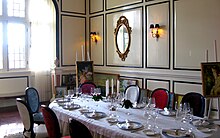Dalat Palace Hotel: Difference between revisions
No edit summary |
|||
| Line 4: | Line 4: | ||
==History== |
==History== |
||
Originally called the Lang-Bian Palace Hotel, it was completed in 1922, and designed to be a site of colonial leisure and power. 'The hotels monumentalism, modernity, luxury and location made it a conspicuous symbol of French domination over the Indochinese central highlands.'<ref> ''Imperial Heights'', Eric Jennings, p.139</ref>It was positioned at the centre of a European business and administrative quarter, dominated the "native quarters" and served as a buffer between them and the European villas. As a luxurious establishment it was intended to act as a serene base from which to explore highland minority villages or conduct big-game expeditions, and to compete with the poshest colonial hotels of [[Southeast Asia]] such as the [[Mandarin Oriental, Bangkok|Oriental Hotel, Bangkok]] and the [[Raffles Hotel]], [[Singapore]]. <ref> Jennings p.139</ref> |
Originally called the Lang-Bian Palace Hotel, it was completed and opened in 1922, at the height of an economic boom, and was designed to be a site of colonial leisure and power. 'The hotels monumentalism, modernity, luxury and location made it a conspicuous symbol of French domination over the Indochinese central highlands.'<ref> ''Imperial Heights'', Eric Jennings, p.139</ref>It was positioned at the centre of a European business and administrative quarter, dominated the "native quarters" and served as a buffer between them and the European villas. As a luxurious establishment it was intended to act as a serene base from which to explore highland minority villages or conduct big-game expeditions, and to compete with the poshest colonial hotels of [[Southeast Asia]] such as the [[Mandarin Oriental, Bangkok|Oriental Hotel, Bangkok]] and the [[Raffles Hotel]], [[Singapore]]. <ref> Jennings p.139</ref>When economic circumstances changed, later in the 1920s, most plans for government structures in Dalat were abandoned, leaving the town with a Palace Hotel as its monumental centerpiece. |
||
In 1925 a city health inspection reported that the kitchens and their surroundings exhibited, "a condition of considerable filth". <ref> Jennings, p.142</ref> |
|||
The Lang-Bian/Dalat Palace became the Dalat Palace after the [[Second World War]], -although earlier uses of the latter also exist. |
|||
In the early 1990s reclusive <ref> The Independent, 12 January 1998 [http://www.independent.co.uk/news/tycoons-estsate-pays-360m-to-children-fathered-on-sex-safaris-1138216.html]</ref> tycoon [[Larry Hillblom]] set out upon a lavish restoration project - a rather plain dining room was converted into a ''grand restaurant'' for example, and the hotel was aimed at attracting high-end tourism. Hillblom, (the 'H' of the [[DHL]] courier empire), invested around forty million dollars into reviving the hotel, that had languished since the end of the [[Vietnam war]] in 1975.<ref> Jennings, p.155-157</ref> |
In the early 1990s reclusive <ref> The Independent, 12 January 1998 [http://www.independent.co.uk/news/tycoons-estsate-pays-360m-to-children-fathered-on-sex-safaris-1138216.html]</ref> tycoon [[Larry Hillblom]] set out upon a lavish restoration project - a rather plain dining room was converted into a ''grand restaurant'' for example, and the hotel was aimed at attracting high-end tourism. Hillblom, (the 'H' of the [[DHL]] courier empire), invested around forty million dollars into reviving the hotel, that had languished since the end of the [[Vietnam war]] in 1975.<ref> Jennings, p.155-157</ref> |
||
Revision as of 16:08, 12 October 2013


The Dalat Palace is an historic luxury hotel in Da Lat, Vietnam. It was frequented by the colonial French as a popular get-away. The hotel is located at 12 Tran Phu Street.
History
Originally called the Lang-Bian Palace Hotel, it was completed and opened in 1922, at the height of an economic boom, and was designed to be a site of colonial leisure and power. 'The hotels monumentalism, modernity, luxury and location made it a conspicuous symbol of French domination over the Indochinese central highlands.'[1]It was positioned at the centre of a European business and administrative quarter, dominated the "native quarters" and served as a buffer between them and the European villas. As a luxurious establishment it was intended to act as a serene base from which to explore highland minority villages or conduct big-game expeditions, and to compete with the poshest colonial hotels of Southeast Asia such as the Oriental Hotel, Bangkok and the Raffles Hotel, Singapore. [2]When economic circumstances changed, later in the 1920s, most plans for government structures in Dalat were abandoned, leaving the town with a Palace Hotel as its monumental centerpiece.
In 1925 a city health inspection reported that the kitchens and their surroundings exhibited, "a condition of considerable filth". [3]
The Lang-Bian/Dalat Palace became the Dalat Palace after the Second World War, -although earlier uses of the latter also exist.
In the early 1990s reclusive [4] tycoon Larry Hillblom set out upon a lavish restoration project - a rather plain dining room was converted into a grand restaurant for example, and the hotel was aimed at attracting high-end tourism. Hillblom, (the 'H' of the DHL courier empire), invested around forty million dollars into reviving the hotel, that had languished since the end of the Vietnam war in 1975.[5]
Literature
- William Warren, Jill Gocher (2007). Asia's legendary hotels: the romance of travel. Singapore: Periplus Editions. ISBN 978-0-7946-0174-4.
References
External links
- Dalat Palace Homepage
11°56′15.3″N 108°26′25.72″E / 11.937583°N 108.4404778°E
